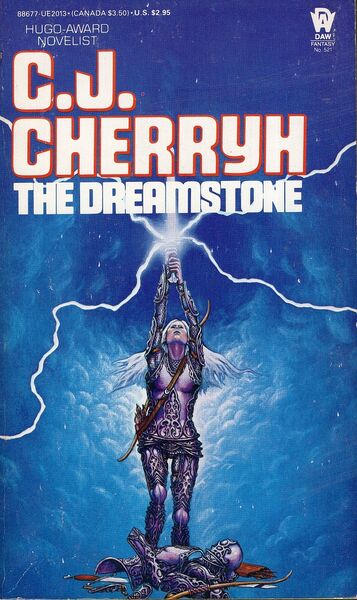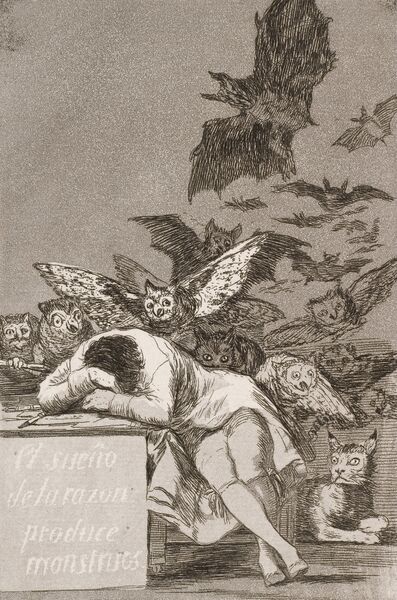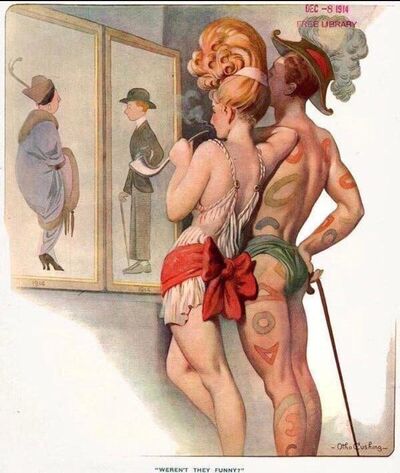https://plaidadder.tumblr.com/post/787786799438282752
Sorry, finally getting around to this. It was a busy weekend.
So the short story is we loved it. It is hugely entertaining, and I think it works well for both hardcore Gilbert & Sullivan nuts and people who have never had the pleasure. On the surface it seems weird that there should be an American following for Gilbert & Sullivan at all, given how self-consciously British they all are, and how much annotation is sometimes required for basic cultural transference to be possible. The one thing that I think explains it is that G&S were very very good at one thing: being extremely silly without being stupid, mean* (*exception to be discussed below) or tedious. This production preserves that quality, even though it makes a lot of other changes, presumably in order to appeal more strongly to modern American audiences.
So that's the short story. The longer story is behind this cut tag, and it will discuss:
- The changes that transform The Pirates of Penzance into Pirates! The Penzance Musical, and my opinions on same
- My ambivalence about the show's final number, "We're All From Somewhere Else"
- Generosity as part of the spirit of live theater, with particular reference to the stage door line
[[MORE]]
So to be clear, we chose to see Pirates! because as soon as I said to PJ, "Hey, they're doing some kind of remix of Pirates of Penzance with Jinkx Monsoon as Ruth," he underwent a small explosion of enthusiasm. Though we don't watch RuPaul's Drag Race, PJ as a trans teenager is familiar with Jinkx Monsoon and PJ did also greatly enjoy Jinkx Monsoon's appearance as Maestro in the Doctor Who episode "The Devil's Chord." PJ was further excited to find out that the Pirate King would be played by Ramin Karimloo, who has had a long career on Broadway and is one of the more beloved of the 21st century Phantoms (as in ALW's Phantom of the Opera). This didn't mean much to me because I am really not a fan of Phantom of the Opera, but I was glad PJ had a further delight to look forward to.
So, briefly (as I so often say, lyingly, before I summarize something), The Pirates of Penzance in its original form is a Gilbert & Sullivan operetta about a young lad named Frederick who has grown up largely on a pirate ship and is now approaching the end of his 21st year. Big changes are coming, because Frederick's apprenticeship will soon be over, and he is about to leave the profession and turn law-abiding citizen. See, Frederick always does his duty; and just as it was his duty to loot and pillage when he was a pirate's apprentice, it will be his duty to thwart and arrest pirates once he's no longer apprenticed. Frederick's former nursemaid Ruth, whose fault it is that he got apprenticed as a pirate in the first place, has also been along for the ride on the pirate ship and is now engaged to Frederick, who since joining the pirates has literally never seen another woman and therefore believes Ruth's claims about her youth and beauty. Well, once ashore, Frederick catches sight of the female chorus, excuse me, the daughters of Major-General Stanley, and is undeceived. Repudating Ruth, he immediately falls in love with Stanley's daughter Mabel.
Just as Frederick is about to help lead the local constabulary to defeat the pirates, the Pirate King and Ruth show up and tell him they've found a loophole. The articles of his apprenticeship indicate that he's bound until his twenty-first birthday, not his twenty-first year. Frederick was born on February 29 in a leap year, which means he has only one birthday every four years. Technically, his time won't be up until he's 84. Devastated but determined to do his duty, Frederick says a tearful farewell to Mabel and returns to the Dark Side. Ultimately, the craven constables are no match for the pirates; but just as they are about to be defeated, the sergeant hits upon the idea of charging the pirates to yield "in Queen Victoria's name." The pirates are so affected by this appeal to their patriotism that they give up and allow themselves to be arrested--until Ruth points out that these pirates are all actually "noblemen who have gone wrong," after which Major-General Stanley pardons them all. The conflict is resolved, Frederick marries Mabel, the male chorus of pirates marries the female chorus of Stanley daughters, and all is well.
So. Pirates! The Penzance Musical is set "in a theater in New Orleans." The metatheatrical conceit is important to the show's aesthetic (the set design is intentionally 2-dimensional and eye-catchingly unconvincing) and also makes room for some charming little metatheatrical moments within the show. Talking to the audience is a G&S performance tradition; this show just makes it a little more obvious. It is explained, in a very funny little pre-curtain speech delivered by "W. S. Gilbert" himself (actually David Hyde Pierce of Frasier fame, who also plays Major-General Stanley), that Gilbert & Sullivan have decided to revise the show so they can incorporate some of the exciting things they've discovered about American musical and theatrical idioms. So, Gilbert explains to us, the play is now set in New Orleans, and words and music have been revised to reflect that.
Musically, for most people, that change is going to be a win. Unless you are an absolute diehart purist who wants everything to sound exactly like your old D'Oyly Carte recordings, you cannot but be charmed by some of the changes. I especially appreciate the fact that Mabel is no longer a coloratura soprano. Lowering the range and going jazzier in the orchestration gives Mabel's music a new warmth and depth which to me made her richer and more interesting. In general the musical ensemble is less like a symphony orchestra and more like a band. This was true for the 1980s version I saw with Ronstadt and Kline, but I think this production made that shift much more successfully. The 1980s version basically tried to sound like 80s pop music, and I got very tired of the electric guitars and the synthesizers. This version seems to be trying to engage in a more thoughtful way with New Orleans's extremely rich musical history, so there's a lot of jazz and folk styles worked in. Again, to me this was an improvement, especially when it came to the Stanley daughters. The fact that Stanley has about a dozen daughters all more or less the same age is explained in the original in a throwaway line about the daughters all being "wards in chancery" (i.e., not his biological children). In this production the daughters occasionally point out that they were "born all over the world," but that Major-General Stanley decided to raise them all in New Orleans because of its diversity and because of America being the land of opportunity. So this Major-General would appear to have had a lot of girls in a lot of ports, more or less simultaneously.
Anyway, it was interesting to me that the main romance is preserved more or less intact (apart from a running gag about how hot Mabel is for Frederick and how fast she's moving on him). "Modern Major-General" is unchanged except for the joke about rhyming "strategy" (again, to my mind, an improvement on the original). All of the biggest changes involve the pirates and Ruth...and the ending.
Ruth is an example of a G&S stock character that Mrs. P and I call The Heinous Alto. She is an older woman with a lower voice who is in love with the much younger hero, who is horrified by her interest in him. Her sexual desires are presented as ludicrous and terrifying. it's a foregone conclusion that this older woman can't possibly be attractive, to the hero or to anyone else, and she is often given a song in which she is forced to acknowledge her own ugliness (my least favorite is "Silvered is the raven hair" from Patience). Once spurned by the hero, she often becomes his antagonist, teaming up with whoever's on the other side of the conflict. The Oedipal overtones of this setup are particularly pronounced in Pirates, given that Ruth was Frederick's nurse.
So, this sounds pretty misogynistic, and it is. The thing is though: the heinous alto is also often the best role in the show. Precisely because she's disqualified from being the ingenue, she's often funnier, crazier, more assertive, and dare I say it sexier than the romantic heroine. This is certainly true for Ruth, who loves being a pirate; as disappointed as she says she is about Frederick, she seems quite happy being the Pirate King's right hand man. She's usually armed, and she takes the lead role in plotting to steal Frederick back. It's easy to see why Jinkx Monsoon, as one of the trailblazing trans performers on Broadway (Chicago's own Alexandra Billings, who we saw as Madame Morrible in Wicked a few years ago, being another), would be attracted to this part. It's also easy to see how, as a trans performer, you might not want some of the things that come with it, including the whole preying-on-the-youth thing and the obligatory song about how unlike a young and attractive woman you really are.
So there are two important changes that this show makes to Ruth's role. First, they cut almost all of the song in which Frederick repudiates Ruth ("O false one, you have deceived me"), during which he points out how "plain and old" she is, and accuses her of "[playing] upon my innocence." Cutting this not only skips the mockery of the aging female body but also saves Ruth from having to beg Frederick to stay with her ("Master, Master, do not leave me"). So with that out of the way, there's more room for the good stuff about Ruth. This is also the song that establishes Ruth's actual age--47--and therefore the 26 year age gap. In the film I linked to above (which is based on the 1980s Broadway production) Angela Lansbury is playing Ruth much older than that, with a gray wig and a granny bun. Monsoon's Ruth may be older or younger than 47; but she's not playing old. However old this Ruth actually is, she's vital, active, passionate, and in on every joke about her own character.
The other thing they've done is imported an aria from another G&S operetta so Ruth can have a solo. This is something the 1980s Broadway production of Pirates did--for Mabel. (In that show, Ronstadt sang "Sorry her lot" from HMS Pinafore). Giving Ruth a solo officially marks her as the 'real' heroine (Monsoon gets top billing in this production, whereas you would never know till you saw the program who's playing Mabel). It's especially interesting that the song they borrowed is "Alone and yet alive" from The Mikado. This is sung by Katisha, one of the truly great Heinous Altos and a character whose rage at being spurned becomes positively homicidal. So this is another way of strengthening Monsoon's Ruth. But also. The main thrust of the lyrics is: I wish that you really could die of a broken heart, but in fact we women are a lot sturdier than that, so instead we're stuck having to survive this emotional devastation. There's an ambivalence built into it: on the one hand, I am tough enough to survive this so go me; on the other hand, survival can be fucking exhausting. When it's sung by a trans woman in the year of our lord 2025, for me at least, that ambivalence really resonates. Yeah, I will survive this latest bullshit as I have already survived worse. But while surviving, I'm going to cry about how fucking hard it is--and you will listen to me do it and feel it with me and it will not invalidate my strength.
So Jinkx Monsoon's performance, and the changes made to her role by the producers, really transform Ruth and really bond the audience with her, and that change arguably has a bigger impact than the change of setting. I personally enjoyed this change, because I am the parent of a trans child with ambitions in musical theater and I felt like it was good for PJ to see that at least in this one instance, Monsoon's presence was strong enough to bend the conventions around her. Like it really mattered to me to see this production not just making space for Jinkx Monsoon's Ruth but actively supporting and augmenting her take on the character.
But probably the most dramatic change to the original libretto is in the last 5 minutes and it has nothing to do with Ruth. The move to the American setting completely nukes the original resolution, which relies on tongue-in-cheek appeals to Victorian patriotism. Because here in America we have no noblemen and also, what, NO KINGS (or queens). So instead of the appeal to Queen Victoria, there's an appeal to "liberty" (the chorale "Hail Poetry" is rewritten as "Hail Liberty"). I don't know exactly how the show gets there because I will say that I don't think they mixed the sound right and I often had trouble understanding the words, especially when they'd been altered. This leads to someone pointing out that one thing all the warring parties have in common is that we're all from somewhere else. After some discussion of how we are a nation of immigrants (I mean not in so many words but that's clearly the subtext), the show ends with everyone singing a song from HMS Pinafore which was originally called "He Is An Englishman," and has now been completely rewritten as "We're All From Somewhere Else."
My ambivalence about this is not because it's not a logical or 'realistic' ending. The original resolution is equally nonsensical, and that's what people come to G&S for: nonsense. In fact I really appreicate the attempt to replicate the very specifically G&S brand of nonsense that closes Pirates, in which it's clear that the real reason everyone decides to stop fighting and get along is that it's time for the show to be over. The thing that's depressing about it is that producing this highly unrealistic moment of union around the idea of immigration as fundamentally American unavoidably engages the scariest and darkest part of what this country is going through right now. The audience applauds the sentiment, but it's not just a reflex action, the way the original pirates react to Queen Victoria's name. It becomes a statement. And there's something sad, for me, about that. It's sad that this needs affirming. It's sad that even as the audience affirms it I can only hear how violently and ruthlessly our government is denying it.
Anyway. More than you were probably asking for about this show; but before I go, point number three, generosity as part of the spirit of live theater.
In general, I am just really grateful to everyone who goes out there and leaves it all on the floor eight times a week. And my gratitude includes everyone from the marquee names to the smallest of ensemble roles. This trip, though, I had a lot of time to observe something that is not normally part of my theatergoing experience: the stage door line.
PJ always wants autographs. So after nearly every show we saw on this trip, PJ lined up outside the stage door and waited. We just watched from someplace nearby. Eventually, some of the performers emerge, in their street clothes, and go down the line giving people autographs. I watched this from pretty close up after Cabaret, and...I mean this production made a very queer show even queerer than it has to be, and there were a lot of young queer people in that stage door line, and they were just overwhelmed at getting to see the performers, even the non-famous ones. Including, of course, PJ, who was thrilled to get signatures from a lot of the Kit Kat dancers as well as Eva Noblezada.
The signature line is a lot. After working from whenever call is to whenever the show ends, the actors doing the signature line (not all of them do, and I don't know whether this reflects what's in people's individual contracts or not) then walk this gauntlet, smiling through their exhaustion, talking to a hundred or so total strangers, many of whom are in an advanced state of verklemptness. I hope they find it rewarding, but it seems to me like the rewards would probably diminish after the show's been running for a while. But these actors respond to their fans as if this performance, their performance, was as unique and special to the actors as it was to the fans; and I just appreciate the joy that this little moment of connection brings to PJ.
The signature line at Cabaret is tightly controlled, like everything else about that production. For a show that really tries to replicate that Berlin cabaret amosphere, they have a LOT of staff working crowd control. I have never seen people approach the intermission ladies' room line with this amount of ruthless military efficiency. By contrast, the stage door line at Pirates! is barely organized. For a long time I wasn't really sure this was even the right line. But anyway, PJ got in it and then Mrs. P and I went across the street to watch.
Naturally we turned our phones on again--having turned them off before the show--and immediately learned that Trump had bombed three nuclear sites in Iran.
This would have been terrible news on any night. Coming on the heels of watching this show with this cast, there was extra awfulness. I have not mentioned yet Ramin Karimloo's performance, which was amazing. He's an incredibly charismatic, charming, forceful, sexy, and very athletic Pirate King, performing feats of strength while singing his heart out. He made the whole "orphan" thing--the pirates never harm orphans, because they're all orphans themselves, and so everyone they capture claims to be an orphan, and the pirates always believe them--his own by engaging in the most elaborate and hilarious reactions every time the subject came up, at one point actually swallowing his sword in frustration. I didn't love some of the rewriting they did for his character, especially the retooled "O better far to live and die;" but all was forgiven when they did "With catlike tread, upon our prey we steal." The combat sequences were very impressive and very funny, and all in all Karimloo's zest for this part was just delightful. At the end of the show, the cast goes into the aisles tossing everyone Mardi Gras beads, for which everyone goes crazy. Karimloo is the only one who tosses them up into the balcony--probably because he's the only one with the guns to get them up there--and he looks like he's really enjoying it. Anyway.
Ramin Karimloo was born in Tehran and grew up in Canada; he's also worked a lot in London. And on the night our Asshole in Chief bombed Iran, after singing a happy song about how what makes this country great is how all Americans are from all over the world, he came out and walked the signature line and took a selfie with PJ.
Jinkx Monsoon came out afterward, with two security people following her. And like...I wish you could see PJ's face as Jinkx Monsoon came over to sign his program. I can, because Mrs. P took a photo at that moment. It was just...really, literally, worth the price of admission. For PJ and for us.
And this is what I mean about generosity. With all the stories about Patti LuPone's bad diva behavior floating around, I feel like it's important to say: she's in trouble for all that because it's not actually the norm. Most performers want things to be good for the other performers; most performers want it to be good for the spectator too. At a time when the tech industry is trying to direct us away from each other and into our screens, most perfomers put themselves through the agony of human connection, on a scale and at an intensity that most of us will fortunately never be called to imitate, night after night after night, and whatever money they make doing that, by God they've earned it.
Anyway. Long answer to a short question, but there it is. We loved it; it was a very funny and very poignant experience; I truly hate the particular historical context in which this particular performance happened; I am really grateful to all of these actors for giving PJ happiness.
Somehow I forgot to mention that Pirates! also imports a number from a different G&S musical for David Hyde Pierce's Major-General Stanley. Iolanthe, a show I've seen and enjoyed but about which could not tell you literally anything about the plot at this point, includes one of the best-beloved pattersongs in the G&S repertoire, "Love unrequited robs me of my rest," or as it is called in the Pirates! program, "The Nightmare Song." It's a rapid-fire description, in rhyming verse, of a nightmare which just jumps from one surreal, awkward, uncomfortable, bizarre situation to another. It works just as well for Major-General Stanley, who is out in the family graveyard in the middle of the night because of his remorse at having lied to the Pirate King about being an orphan, as it does for the judge in Iolanthe who's up with unrequited-love-induced indigestion. Unfortunately for the adapters it incorporates a lot of English place names because it's funny how hard they are to rhyme, so there was some editing done on the lyrics; but it's still a tour de force and it's still cool to watch David Hyde Pierce, who looks kind of frail but is incredibly sharp, nail it.
https://plaidadder.tumblr.com/post/787786799438282752






